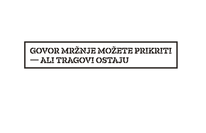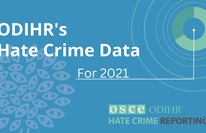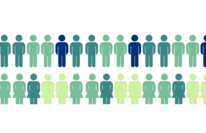



The seventh evaluation on the Code of Conduct on Countering Illegal Hate Speech Online shows that the number of notifications reviewed within 24 hours (64.4%) has decreased as compared to 2021 (81%) and 2020 (90.4%). Only TikTok has increased its performance (from 82.5% to 91.7%). The average removal rate (63.6%) is similar to 2021 (62.5%), but still lower than in 2020 (71%). Looking at the individual performance of the platforms, most of them (except for YouTube) have removed less hate speech content than in 2021. The quality of feedback to users’ notifications has improved as compared to previous monitoring exercises.

On the International Day for Tolerance, on 16 November 2020, OSCE Office for Democratic Institutions and Human Rights (ODIHR) published its data on hate crimes for 2021.

On the International Day for Tolerance, on 16 November 2020, OSCE Office for Democratic Institutions and Human Rights (ODIHR) published its data on hate crimes for 2020.

20 October 2021
11:00 - 17:00 EET (Helsinki)

The publication is intended for people who are working on overcoming institutional, social, and cultural obstacles – either through their position in the Roma community or their institutional position – to achieve social equality for the Roma.

At the “Conference on Innovative Methods of Young Roma Inclusion in Society” held on 15.07.2021. from 10am to 2pm in the Novinarski Dom in Zagreb and online, we presented the new handbook “Organisation the Job Shadowing and Mentoring Programme” together with trainees, a mentor, and the Roma youth organisation of Croatia (RYOC).

Judgments of the European Court of Human Rights (ECtHR) have a crucial role in respecting the rights of individual’s when member states fail to meet their obligations under the European Convention on Human Rights (Convention).

As part of the project "Facts Against Hate", CPS is presenting two examples of good practice of intersectoral cooperation in the field of prevention of discrimination, hatred and violence.

Ministry of Interior of the Republic of Finland published a guide for police officers and stakeholders "Good practices for identifying and preventing acts of hatred". This guide is a part of the joint project Facts Against Hate.
The guide is also available in Finnish, Swedish and Croatian.